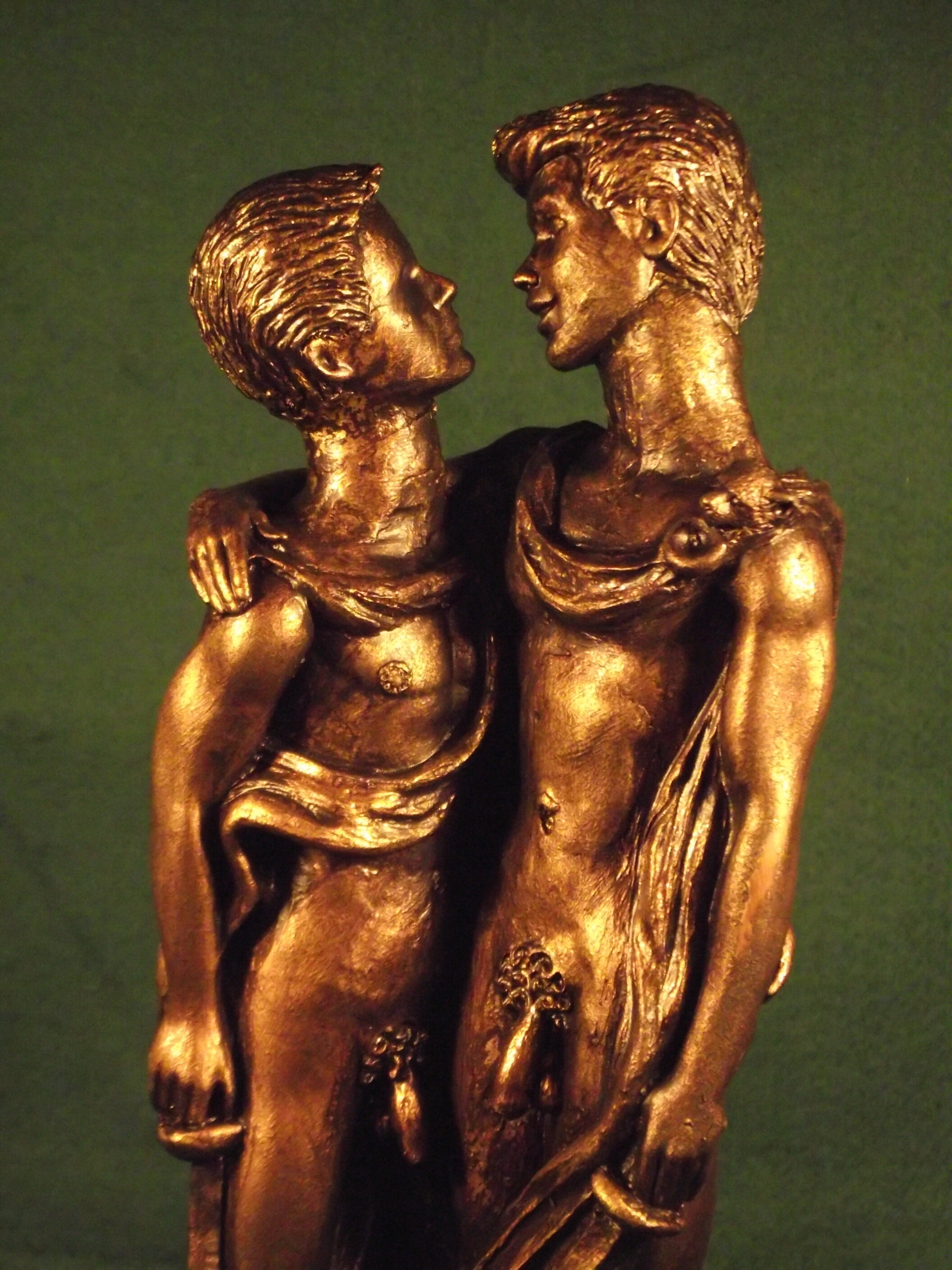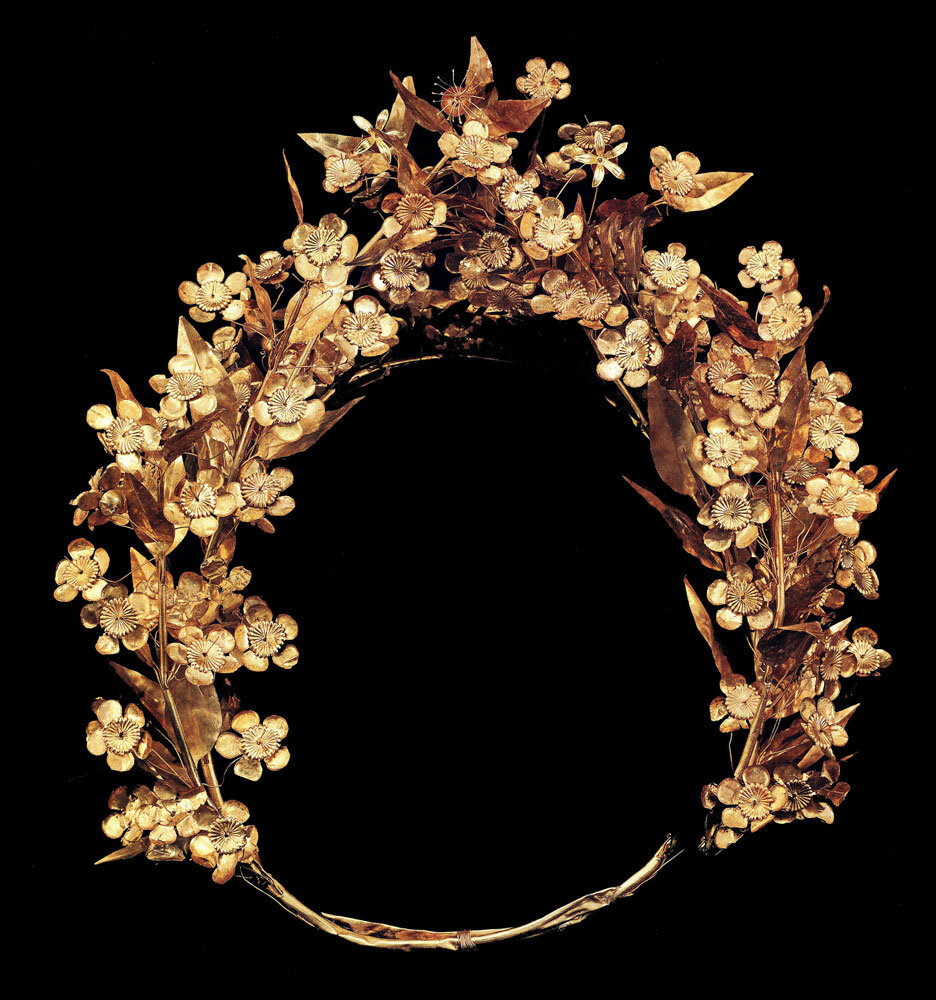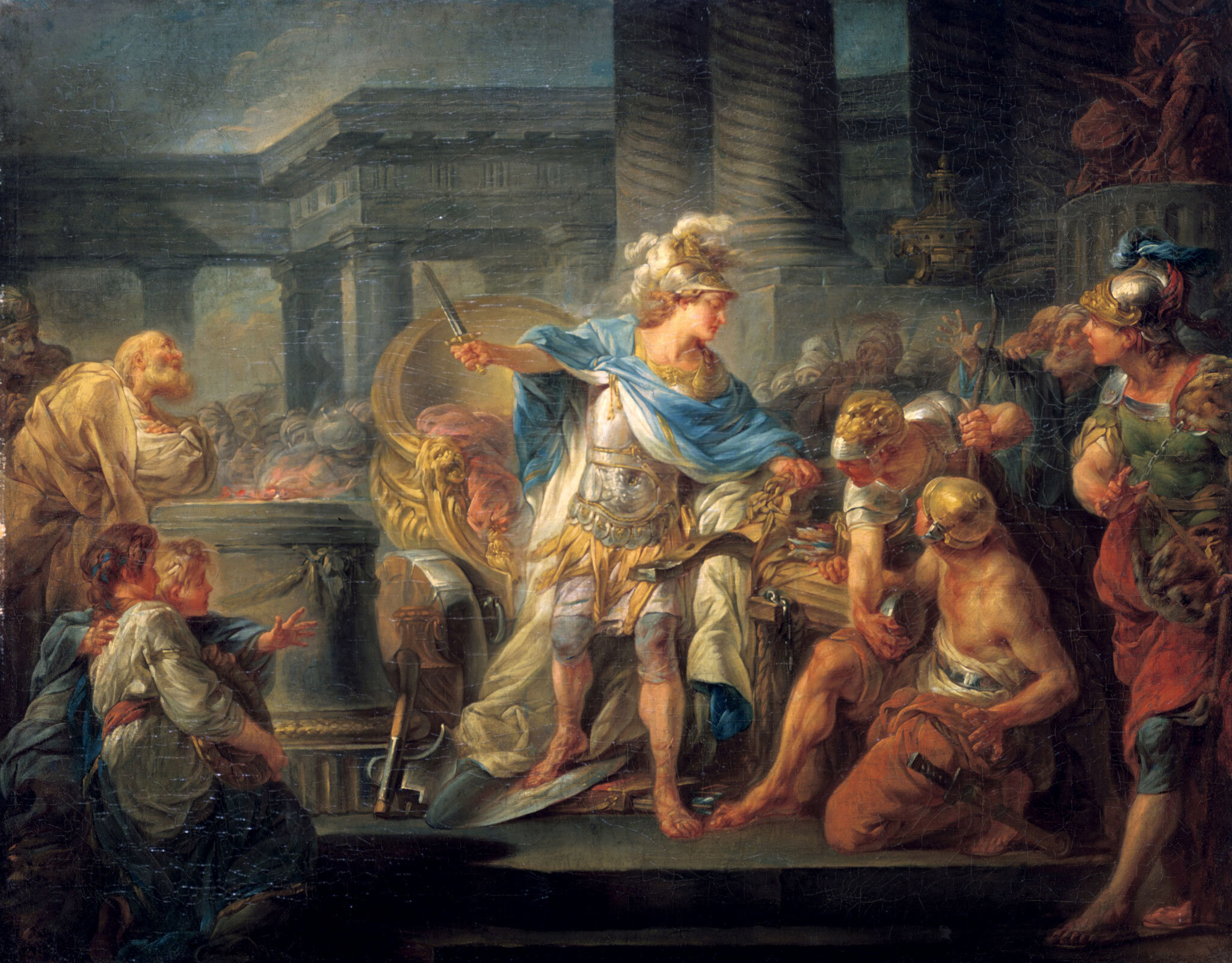Born: 356 B.C.E.
Died: 323 B.C.E.
Known For: Conquering the ‘known’ world (for no reason), a predilection for Persian eunuchs AND throwing the love of his life, Hephaistion, the most fabulous funeral known to ancient man.
Alexander the Great Murdering Fuckboy and Bisexual Queen of the World. © Historical Homos 2020
Why So Great?
The notorious ‘Alexander Mosaic’ from House of the Faun at Pompeii, c. 100 BCE. The mosaic is possibly a reproduction of a contemporary painting of Alexander by Apelles. Wikimedia Commons.
Alexander. The Great. Murdering. Fuckboy.
Let’s unpack that, shall we?
We’re taught to say “Alexander the Great”, because history calls any man “great” who skullfucks the world in the name of bettering it.
Alexander did master much of the ‘known’ world in his *thankfully* short life. He seems to have believed that through world domination he could unite Greece, his native Macedon and the many nations living between Egypt and India into some kind of interracial, Greek-dominated utopia. (Spoiler alert: he couldn’t.)
Alexander is also considered “Great” for his military genius. (Still unclear why killing people efficiently is a form of ‘genius’.) And that brings us to his second title: Alexander the Murdering.
Now, dear reader, you may argue that all’s fair in war. You may argue, like some hawkish FOX News hell-spawn, that the ancient Mediterranean was already a cesspool of military aggression long before Alexander arrived. But at the end of the day, you cannot argue your way around the plain fact that Alexander put countless lives to the sword for a dream of ‘imperial unity’ that only his megalomania could sustain.
The ancients lionized Alexander for this dream. And that’s because Alexander was—literally and figuratively—a god to them. He was the mortal incarnation and legitimizer of one of the ancients’ unwritten natural laws: “Might is Right”.
His military success was publicized as fatalistic proof that the gods approved of Alexander’s actions—nevermind the spectacular collapse of this empire immediately following his death.
Which brings us to “Alexander the Fuckboy”. Contrary to our perverted hopes, Alexander was not a giant slut. He was, by most accounts, a paragon of self-restraint:
“He was wont to say that sleep and the act of generation chiefly made him sensible that he was mortal; [which is] to say, that weariness and pleasure proceed both from the same frailty and imbecility of human nature.” (Plutarch, Alexander 22)
Bet he was fun at parties.
In reality, Alexander was only restrained when it came to the women in his life. He was a raving manwhore for the men—“a quite mad boy-lover,” as one source puts it—though he had refined tastes and only infrequently dipped his wick on campaign.
Alexander in his trademark (and admittedly fabulous) white feather helmet, looking like a totally murderous fuckboy. Wikimedia Commons.
Above all, Alexander was a fuckboy in his conquests. The so-called genius raced sluttishly from kingdom to kingdom, deserting his native Macedon, showering his soldiers in pillaged wealth, liberating locals (so he said) from Persian dominion and establishing new rulers in their place (who mostly ended up ruling exactly the same way the Persians had before them).
And when he died, this clusterfuck of brilliant conquests fell to pieces.
Next time you hear someone call Alexander “Great”, remind them that this Murdering Fuckboy was actually just a rich kid lusting after blood, butts and all the riches of Babylon.
So how did the moneyed twink of Macedon become bisexual queen of the world?
It starts where every homo’s story does: the mother.
The Queen Behind the Queen
Roman imperial coin thought to depict Olympias, mother of Alexander the Fuckboy. The snake coil around her wrists might reference her devotion to the snake-cult of Dionysos. © Staatliche Museen zu Berlin.
Olympias of Epirus was the main reason Alexander became such a successful psycho. She was the fourth wife of Philip II of Macedon, Alexander’s father, but she liked to tell Alexander his real father was Zeus and that her side of the family descended from the great hero of Homer’s Iliad: Achilles.
Olympias lived to fuel the fire of Alexander’s daddy issues. Most of these stemmed from the fact that Philip was a polygamist, which allowed him to sire as many bastards as his royal dick desired.
Alex’s claim to the Macedonian throne was therefore constantly threatened, and he always had to compete with his half-siblings for daddy’s royal attention. All of which meant Alexander spent his youth trying to prove his superiority to his ambitious, oversexed and abusive father.
Megalomania? Check. Childhood trauma? Check. Narcissistic need to gain self-esteem through power and control? Check.
With parents like these, it’s no wonder little Alex became such a high-functioning psychopath.
But it wasn’t all bad for the poor little rich girl. Alexander’s first-class education was managed by none other than Aristotle. And he was brought up with the best and brightest. One of these, Hephaistion, would become his right-hand man, his lover (we think) and the best bro-before-literally-any-other-hoe of his life.
A very modern representation of the Sacred Band of Thebes. Malcolm Lidbury. Wikimedia Commons.
In 338 BCE, Alexander finally got a chance to prove himself to Daddy Phil at the Battle of Chaironeia.
At this pivotal battle, 16-year-old Alexander led a cavalry charge against the Thebans’ Sacred Band, annihilating the notorious squadron of male lovers who had been feared throughout Greece for their boyfriend-inspired bravery.
His father never forgot this (low-key homophobic?) attack on the Theban lovers, and started to warm to Alexander.
Eventually, Alexander’s temper and Olympias’ meddling got them both into trouble with Philip, who was too busy marrying nubile young nobles to notice the boy’s growing impatience for power.
In a tale as old as motherfucking Oedipus, one thing led to another, Philip was assassinated, Alexander took the throne at age 20 and, while all the gossiping bitches clamored to figure out whodunit (hint: Olympias), our twinky, masc-for-masc psychopath set out to take over the whole damn world.
Tea Time: The Gay History of Philip’s Assassination
King Philip II of Macedon was…quite the daddy. I’d fight over him, too. © Glyptothek Copenhagen.
Philip II of Macedon, it turns out, was also quite the fuckboy. While more known for his womanizing — he had 7 wives and countless mistresses — Philip also had a thing for sodomy.
Specifically, sodomy with his bodyguards. One of these high-born hotties was Pausanias of Orestis – by all accounts the tastiest of the bunch and Philip’s future assassin.
Despite Pausanias’ charms, Philip’s eye strayed and eventually landed on another, younger Pausanias (creatively called Pausanias the Younger). Pausanias of Orestis couldn’t stomach the jilt. He responded by publicly accusing Pausanias the Younger of being a hermaphrodite who would bang anyone and anything that crossed his path.
P the Younger couldn’t stomach this either—me smells some truth to it?—so the next time he and Philip went off warring, Pausanias the Younger stepped in front of the king in battle, threw down his weapons and died from the blows intended for his royal sugar daddy.
The tea was immediately spilled all over Macedon, not least because Pausanias the Younger had confided to Attalos (possibly one of his lovers and one of Philip’s top generals) that he was planning this romantic suicide all along.
A slightly less tragic scene of homosexual debauchery. © British Museum
Attalos decided to take revenge in a very ugly way. He invited Pausanias of Orestis to a fabulous party, got him wasted and then handed over his unconscious body to be used and abused by his servants.
Pausanias of Orestis was outraged and accused Attalos of the crime in front of the king. Philip tried to shut Pausanias up with presents and a higher rank in the king’s guard, but refused to punish Attalos. (Philip needed him for his constant military campaigns.)
Pausanias refused to take anything else lying down. At a royal marriage ceremony, Pausanias cornered the king, stabbed him in the ribs and tried to flee before the guard caught him and executed him on the spot.
A very gay tragedy for a very bisexual king and his very fuckboy ways.
Rampage, Revenge and Reputation
Alexander the Great Murdering Fuckboy, pictured next to an earring of Zeus and Ganymede, legendary divine faggots of antiquity. © Historical Homos 2020
Back to our story.
In 336 BCE, the newly crowned Alexander—like any self-respecting diva—wanted a big début.
She chose as her première nothing short of Greece’s revenge on the big, bad Persian Empire, which had threatened Greek liberty for centuries prior.
Alexander first got Greece in order. He went south from Macedon and sacked the city of Thebes mercilessly, killing thousands of Greeks and selling many more into slavery. After this maniacal, fear-mongering outburst, the rest of the Greek city states quickly fell into line.
With his base strengthened, he was ready for real conquest.
So he marched over to Turkey toward Persia. Along the way he famously stopped at the ancient tourist trap of Troy, mythical battleground of Homer’s homoerotic heroes.
This beautiful mosaic may depict Alexander and Hephaestion. ‘Stag Hunt Mosaic’ from House of the Rape of Helen, Pella, Macedonia, c. 300 BCE. Wikimedia Commons.
Alexander headed straight for the tombs of Achilles and Patroklos (Achilles’ legendary lover). He sacrificed to Achilles, then celebrated this momentous occasion by stripping down and playing games with his friends in the nude.
Platonic.
Meanwhile, Alexander’s best bum buddy, Hephaistion, was sacrificing at the nearby tomb of Patroklos — publicly signaling to the army and all posterity exactly who was top and bottom in their 100% heterosexual friendship.
Alexander quickly went on to win his first major battle against the Persians at the Battle of Granicus in 334 BC. Like a sharp hit of poppers, this first triumph opened the rest of Asia right up — all the major cities fell or surrendered as Alexander forced his way through the sphincter of the Levant toward the real prize: Egypt.
Eunuchs and the End of the World
Alexander was famously moderate in his sexual appetites. Until he conquered Persia and met a beautiful eunuch named Bagoas. © Historical Homos 2020
Alexander stopped off in Egypt for a while, seeing the sights and catching up on other admin, like getting himself declared divine by the local priests.
He was soon back on the campaign trail, taking province after province and heading east toward the Persian capital. He defeated the Persian royals resoundingly at the Battle of Gaugamela (331 BCE) and was proclaimed King of Asia.
After he took the major cities of Babylon, Susa and Persepolis by 330 BCE, he paused and took stock of the unconscionable wealth he had seized from the Persian King Darius.
Included in this booty was some actual booty: a drop-dead-gorgeous eunuch named Bagoas.
Very little is known about Bagoas, though his name was important enough to survive in our sources. He was an official court eunuch of Darius, so naturally when Darius was messily executed, Bagoas became part of Alexander’s retinue.
Alexander soon set off from the Persian capitals to push his army further and further East in his never-ending quest for world domination. Bagoas – along with every other army-whore, courtesan, court eunuch and horny soldier you can imagine – came along for the ride.
The crafty eunuch seems to have captivated Alexander’s attention more than any of them. Alexander had been so moderate on previous campaigns that he was known for refusing boys offered by his friends. Once, when he was eyeing his buddy Charon’s boyfriend at a party, Charon told his lover to go give Alexander a kiss, and Alexander refused with this reply: “That will not delight me so much as it will pain you.”
This restraint seems to have changed after Alexander met his favorite eunuch. On their way back from India, the beautiful, ball-less Bagoas won a dancing contest, and by the end of the performance, the crowd went so wild they started screaming at Alexander to make out with him. Alexander greedily complied and, with the crowd going wilder and wilder, planted another juicy one on the beautiful Bagoas.
Funeral wreath from a royal Macedonian tomb at Vergina. Just to give you an idea of what a “lavish” funeral might have entailed for the likes of Alexander and his boytoy, Hephaistion.
Bagoas accompanied the army through some of their darkest days, including a glacial march through the Hindu Kush into India and a devastating march through the Pakistani desert of ancient Gedrosia. So they probably liked him as one of their own.
After the horrific desert march, Alexander’s army believed they had reached the end of the world. They demanded to go back home and, heartbroken that he hadn’t conquered every single thing possible, Alexander bitterly indulged them.
By 324 BCE, they were back in Persia, Hephaistion was dead, Alexander’s mental health was wearing thin, and the cracks in the grand design were beginning to show.
Alexander crucified the physician who failed to save Hephaistion and promptly threw his best dead buddy a multi-million dollar funeral, the most lavish the ancients had ever seen.
Then in 323, under somewhat suspicious circumstances, Alexander joined his true love when he died in Babylon.
He was 33 years old.
Decline & Fall
Possibly Alexander the Great, depicted with an elephant skin headdress. Alexander’s conquests changed Greek art and iconography forever. © Metropolitan Museum of Art
The end of Alexander is seen as the end of the Classical era and the beginning of the Hellenistic: a centuries-long period that saw Greek culture reach new heights of cosmopolitan excellence across the Mediterranean.
Because of the titanic shifts in culture and politics caused by his career, we tend to read Alexander as a shaper of history. And we value him for it.
But gay culture also values him as a paragon of masc-for-masc virtue. He was, unlike so many of us we seem to think, a masculine anomaly of queer history. A military man. A conquering man. A hero.
Alexander certainly thought he was: a new Achilles, who through blood and toil would unite East and West under benevolent Grecian despotism.
In this way, he was sort of a proto-Orientalist, whose only redeeming feature was that in a world of Persian-hating Greeks, he actually grew to admire Eastern cultures with genuine respect (that is, after he slashed, burned, sacked and raped his army’s way through them).
Alexander was perhaps Great for the sheer ambition of this project, and the stamina he maintained in his army to see it through.
But if he was great, he was also Alexander the Evil Egomaniacal Psychopath.
Alexander the Fuckboy, looking extremely masculine and heroic. Wikimedia Commons.
Legitimizing his plans for world domination rested entirely on his construction as the “Great Divine King” in the ancient world, a concept that was anathema to most political systems—including monarchies—in Greece and Macedonia (though it was deeply familiar to the Egyptians and Persians).
As a semi-divine figure, whatever Alexander did became ‘great’ simply by virtue of him doing it.
That’s why his divinity was so carefully curated IRL, from Olympias to the Egyptian oracles. As a divine representative on earth, Alexander’s insatiable greed and megalomania could be morally justified.
But that world only made sense when he was in it. And that’s why the whole thing fell apart when he died.
Alexander certainly was an anomaly of the ancient world: few successors could rival his list of bloody accomplishments. But let’s not forget that this great man of history was also a great destroyer, too.
And not just of Bagoas’ asshole.
Alexander the Great Murdering Fuckboy. © Historical Homos 2020
Further Reading
Arrian. Life of Alexander. Loeb Classical Library.
Crompton, Louis. Homosexuality and Civilization. 2003.
Plutarch. Lives. Dryden Translation, ed. Clough. Modern Library. 2001.
Russell, Paul. The Gay 100. 1995.
Quintus Rufius Curtius. History of Alexander. Loeb Classical Library.













